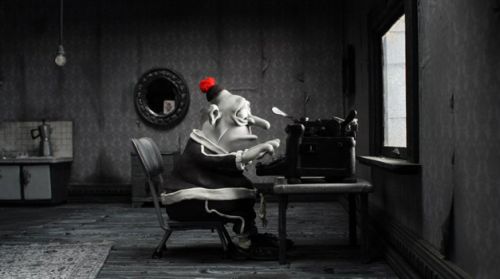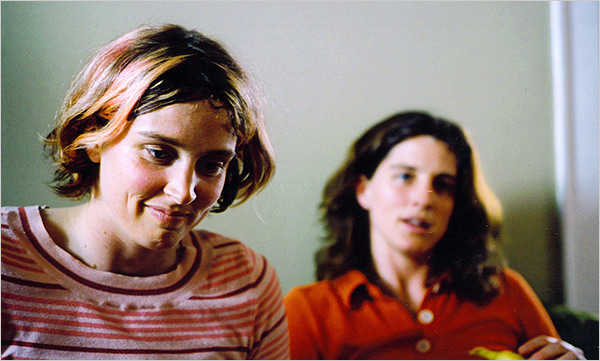
Max becomes friends with an Australian girl in charming claymation film
MARY AND MAX (Adam Elliot, 2009)
JCC in Manhattan and other venues
334 Amsterdam Ave. at West 76th St.
Tickets: $10 per screening, Festival Pass $40
Special events: free (some require advance reservations)
212-505-5700
www.maryandmax.com
www.reelabilities.org
www.jccmanhattan.org
 Having just played the New York Jewish Film Festival at Lincoln Center, Adam Elliot’s stop-motion animated MARY AND MAX is now the opening-night selection at the second annual ReelAbilities: NY Disabilities Film Festival, which runs January 28 through February 2 at the JCC in Manhattan and other venues. Winner of numerous awards all over the world, MARY AND MAX is the touching, unforgettable tale of two loners who become pen pals, sharing the details of their hopes and dreams over decades. Mary (voiced by Bethany Whitmore as a young girl and Toni Collette when she gets older) is an oddball child living in a small town in Australia. Seeking a friend, she sends a letter to a random person she finds in a phone book. Max (Philip Seymour Hoffman) is a childlike middle-aged man suffering from Asperger’s Disorder in New York City. Through the years, their long-distance relationship goes through emotional ups and downs, building to a surprising ending that still has us scratching our heads. Elliot, who won an Oscar for his short film HARVIE KRUMPET in 2003, wrote, directed, and designed the sets and characters for MARY AND MAX, inspired by the photography of Diane Arbus. He brings Mary and Max to life in charming ways, adding little details and flourishes that will endear you to them even though they both are very, very strange. The film, wonderfully narrated by Barry “Dame Edna” Humphries, required more than 130,000 individual frames and 212 puppets and took 57 weeks to shoot; the result is simply charming. (MARY AND MAX will be screened January 28 at the JCC in Manhattan, January 30 at the JCC in Staten Island, January 31 at the Cinema Arts Centre in Huntington and at Abilities! in Albertson, and February 1 at Columbia University.)
Having just played the New York Jewish Film Festival at Lincoln Center, Adam Elliot’s stop-motion animated MARY AND MAX is now the opening-night selection at the second annual ReelAbilities: NY Disabilities Film Festival, which runs January 28 through February 2 at the JCC in Manhattan and other venues. Winner of numerous awards all over the world, MARY AND MAX is the touching, unforgettable tale of two loners who become pen pals, sharing the details of their hopes and dreams over decades. Mary (voiced by Bethany Whitmore as a young girl and Toni Collette when she gets older) is an oddball child living in a small town in Australia. Seeking a friend, she sends a letter to a random person she finds in a phone book. Max (Philip Seymour Hoffman) is a childlike middle-aged man suffering from Asperger’s Disorder in New York City. Through the years, their long-distance relationship goes through emotional ups and downs, building to a surprising ending that still has us scratching our heads. Elliot, who won an Oscar for his short film HARVIE KRUMPET in 2003, wrote, directed, and designed the sets and characters for MARY AND MAX, inspired by the photography of Diane Arbus. He brings Mary and Max to life in charming ways, adding little details and flourishes that will endear you to them even though they both are very, very strange. The film, wonderfully narrated by Barry “Dame Edna” Humphries, required more than 130,000 individual frames and 212 puppets and took 57 weeks to shoot; the result is simply charming. (MARY AND MAX will be screened January 28 at the JCC in Manhattan, January 30 at the JCC in Staten Island, January 31 at the Cinema Arts Centre in Huntington and at Abilities! in Albertson, and February 1 at Columbia University.)

BEESWAX looks at the Hatcher twins at Disabilities Film Festival
The festival also features Ziah H. Hamzeh’s HENRY O! documentary about a blind sportscaster; Andrew Bujalski’s widely praised BEESWAX, about the growing problems between twin sisters; Niko von Glasgow’s NOBODY’S PERFECT, in which the director tries to find eleven other people affected by Thalidomide to pose naked with him for a calendar; Dorit Hakim’s WHITE BALANCE, which follows a young boy as he loses his hearing; Gillies MacKinnon’s ZIG ZAG LOVE, a love story between a male cancer patient and woman with cerebral palsy; and Justin Edgar’s HUNGER HOUSE, a short that looks at how the Nazis treated people with disabilities. All screenings will be followed by a discussion with either the filmmakers or experts in the field covered in that work. In addition, the festival will host several special free events, including a panel discussion with a group of sighted, visually impaired, and completely blind photographers; dances from choreographer Heidi Latsky and the Infinity Dance Company; an autism-friendly concert with Jarrod Emick and Andrew Ross and another with the group Flame; a theatrical piece from Creative Alternatives NY and the Adaptations Drama Group; and a Kids Club art exhibit.